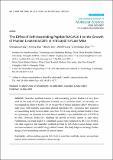The Effect of Self-Assembling Peptide RADA16-I on the Growth of Human Leukemia Cells in Vitro and in Nude Mice
Author(s)
Tang, Chenkang; Shao, Ximing; Sun, Binbin; Huang, Wenli; Zhao, Xiaojun
DownloadTang-2009-The Effect of Self-Assembling Peptide RADA16-I .pdf (714.4Kb)
PUBLISHER_CC
Publisher with Creative Commons License
Creative Commons Attribution
Terms of use
Metadata
Show full item recordAbstract
Nanofiber scaffolds formed by self-assembling peptide RADA16-I have been used for the study of cell proliferation to mimic an extracellular matrix. In this study, we investigated the effect of RADA16-I on the growth of human leukemia cells in vitro and in nude mice. Self-assembly assessment showed that RADA16-I molecules have excellent self-assembling ability to form stable nanofibers. MTT assay displayed that RADA16-I has no cytotoxicity for leukemia cells and human umbilical vein endothelial cells (HUVECs) in vitro. However, RADA16-I inhibited the growth of K562 tumors in nude mice. Furthermore, we found RADA16-I inhibited vascular tube-formation by HUVECs in vitro. Our data suggested that nanofiber scaffolds formed by RADA16-I could change tumor microenvironments, and inhibit the growth of tumors. The study helps to encourage further design of self-assembling systems for cancer therapy.
Date issued
2009-05Department
Massachusetts Institute of Technology. Center for Biomedical EngineeringJournal
International Journal of Molecular Sciences
Publisher
Molecular Diversity Preservation International
Citation
Tang, Chengkang et al. “The Effect of Self-Assembling Peptide RADA16-I on the Growth of Human Leukemia Cells in Vitro and in Nude Mice.” International Journal of Molecular Sciences 10.5 (2009) : 2136-2145. © 2009 MDPI Publishing.
Version: Final published version
ISSN
1422-0067